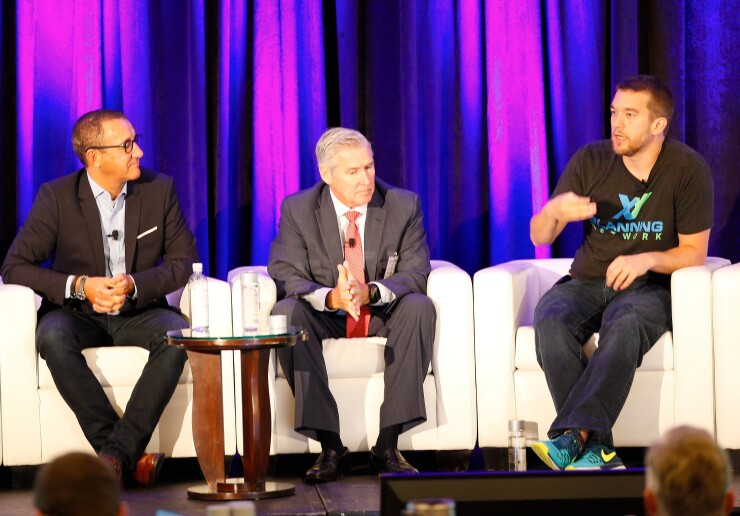Although technological innovation and demographic shifts are changing how financial advice is consumed and compensated, top executives say many advisors are ignoring these trends to their peril.
“Advisors have to wake up from their coma,” United Capital CEO Joe Duran told the audience at the Disrupt Advice conference in New York on Tuesday. (The conference is sponsored by Financial Planning publisher SourceMedia.)
Duran says his biggest concern is that most advisors aren’t acknowledging seismic shifts in planning: In the past four years, he notes, Vanguard has consumed $900 billion in ETF inflows alone, while its digital advice platform nears $100 billion in AUM.

“They have eviscerated the wealth management industry,” he says. “They can charge 30 basis points for advice, because they are making money on the products.”
Additionally, Duran says many advisors are oblivious to the real value their clients see in their service, which is financial planning, not investment performance.
“The obstacle is in their heads,” he says. “Clients want you to open up and talk about what they care about. Not about the beta of their portfolio. They want to talk about what matters.”
SHOW OF HANDS
The next generation of advisors is already looking to do things differently, says XY Planning Network co-founder Alan Moore, who asked for a show of hands from all the advisors in the room if they would be happy making $100,000 a year. No hands went up.
“A lot of young planners would be thrilled to make $100,000 — want just to serve a group of clients they really love and work 40 hours a week,” he says, noting that the figure he mentioned was still two-and-a-half times the median American salary. “The reality is they don’t want to make as much money as you did.”
-
What breakaway brokers and service providers can learn from the collapse of Sanctuary Wealth Services.
January 26 -
A consortium of fintech companies have formed a new industry group to advocate for better data sharing via open APIs.
January 19 -
Advisers have been warned: SEC's exam guidance to focus on cyber threats and issues involving seniors, leaving little excuse for noncompliance.
January 13
Additionally, Moore sees RIA practices heading toward niches, rather than a generalized approach.
“Vanguard is going to be the Bud Lite of financial planning,” he says. “We get to be the craft beers of the industry. I don’t need a million clients like Vanguard. We can’t be all things to all people. We tried to do that for so long and we’re going to move past that now.”
Of course, change is easier said than done, notes David Canter, head of Fidelity’s RIA business, which today officially launched its digital wealth advice platform, Fidelity AMP.
Canter recalls working with a very traditional Boston firm staffed by numerous CFAs who made their careers on portfolio analysis and recommendations.
“It’s hard to change from being investment focused to holistic planning,” Canter says. “They weren’t changing who their clients were, just how they are engaged. And they were afraid about how to engage.”
Canter advises firms emphasize their “unfair advantage,” to remain competitive, which he terms “something you can do that can’t be replicated by computer.”
‘NOW FLIPPED’
The industry has seen values change, notes Don Plaus, head of Merrill Lynch’s private banking and investment group.
“Twenty-seven years ago, wealth management was very narrowly focused. Now it has expanded out greatly,” Plaus says. “At that time you got paid for the transaction, and advice was free. That’s now flipped.”
The expansion of hybrid platforms and bank digital advice promises big changes and fierce competition in automated wealth management.
“The bottom line is our clients are demanding more from our advisors,” he says, adding that Merrill has adopted a team approach to financial planning.
There have been eureka moments, he says. “Understanding the intent of wealth is important.”
Duran says advisors will also need to understand which client they want to serve.
“Not everyone can drive a Mercedes,” he says. “Who are you built for?” He says his firm has decided to help people at higher income levels because they can afford to make choices about the help they receive: “It’s too expensive to serve someone who does not have a lot of choices.”
But many wealth management firms will undoubtedly have to broaden their service scope, Canter says.
“The big are getting bigger,” Canter says. “Volume is going to matter.”






